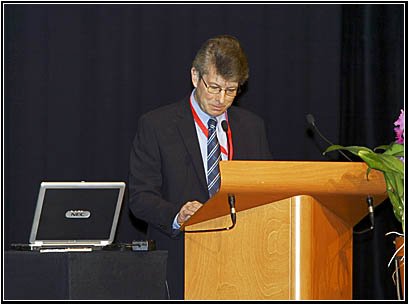ON: Dr. Phillip
Cribb, you are considered as someone who has a favourable opinion about
the Convention on International Trade in Endangered Species of Fauna
and Fauna (CITES). However, in your lecture, you said that it has proved
to be a less useful tool than had been supposed. Why?
PC: I am not a defender of CITES but a pragmatist
and am concerned about orchid conservation. CITES has been ratified
by 170 or so countries and, therefore, that the orchid world needs to
work with CITES to make sure that it operates for the benefit of orchid
conservation. The nature of CITES whereby it is interpreted and operated
differently in many countries has caused problems for horticulturists
and scientists. We also see orchid smugglers operating unimpeded when
the authorities know what they are doing, there is no justice in that
and the rest of us suffer.
ON: In what way
could be the CITES be modified to became more efficient?
PC: More uniform implementation and better training
for Customs and Management authorities would be a good start.
ON: You also
talked about the difficulty found by the scientists when working on
listed plants. Don't you think that they should have facilities to get
the certificates in order to study the plants? How could it be done?
PC: CITES allows the registration of institutions
so that specimens can be exchanged but few institutes in orchid-rich
countries are registered, despite their requests to register with their
governments. Presumably, those governments are concerned about losing
control of the operation. In reality many institutes in developing countries
work closely with institutes abroad and their lack of registration seriously
impedes their work in identifying material and in providing good information
for conservation of native species.
ON: The critics
of the CITES mention the inclusion of hybrids. How could an artificial
hybrid be in danger?
PC: They were included because Customs officials
could not be expected to distinguish between species and hybrids. However,
if you have been following recent developments, artificial hybrids of
Phalaenopsis, Vanda, Dendrobium and Cymbidium
have been delisted from CITES and can be traded legitimately without
CITES. Others will surely follow.
ON: Bottled seedlings
were removal so they are not subject to CITES restrictions. However
a divided plant is considered as artificially propagated and then can
be sold even in the international market? It isn't an incoherence?
PC: The exclusion of flasked seedlings was easy
to implement. Divisions are less easy to identify. However, they can
be legally traded internationally with a CITES certificate. If the hybrid
deregulation proceeds as expect, this issue should become less of a
problem.
ON: In what way
can people interested in orchids (orchid growers or scientists) can
help to amend CITES?
PC: By acting responsibly when buying plants.
By being represented as observers at CITES Conference of the Parties
meetings which are held biennially. By informed lobbying of governments
and by providing governments with well-argued cases for improving or
changing CITES regulation and implementation.
ON: Do you like
to add something?
PC: In the past, the often irrational and ill-informed
reaction of the orchid community to CITES and its officials harmed our
work to improve CITES for the benefit of the orchid community at large.
Constructive views are more helpful than negative ones.
ON: Thank you,
Phillip
Cribb.
Photo by Sergio
Araujo
|
Any
kind of reproduction (print, digital or anyone other) of any
type of material of this site - texts, layout, photos, images
and others - is strictly forbidden without previous written
permission by the authors.
|

